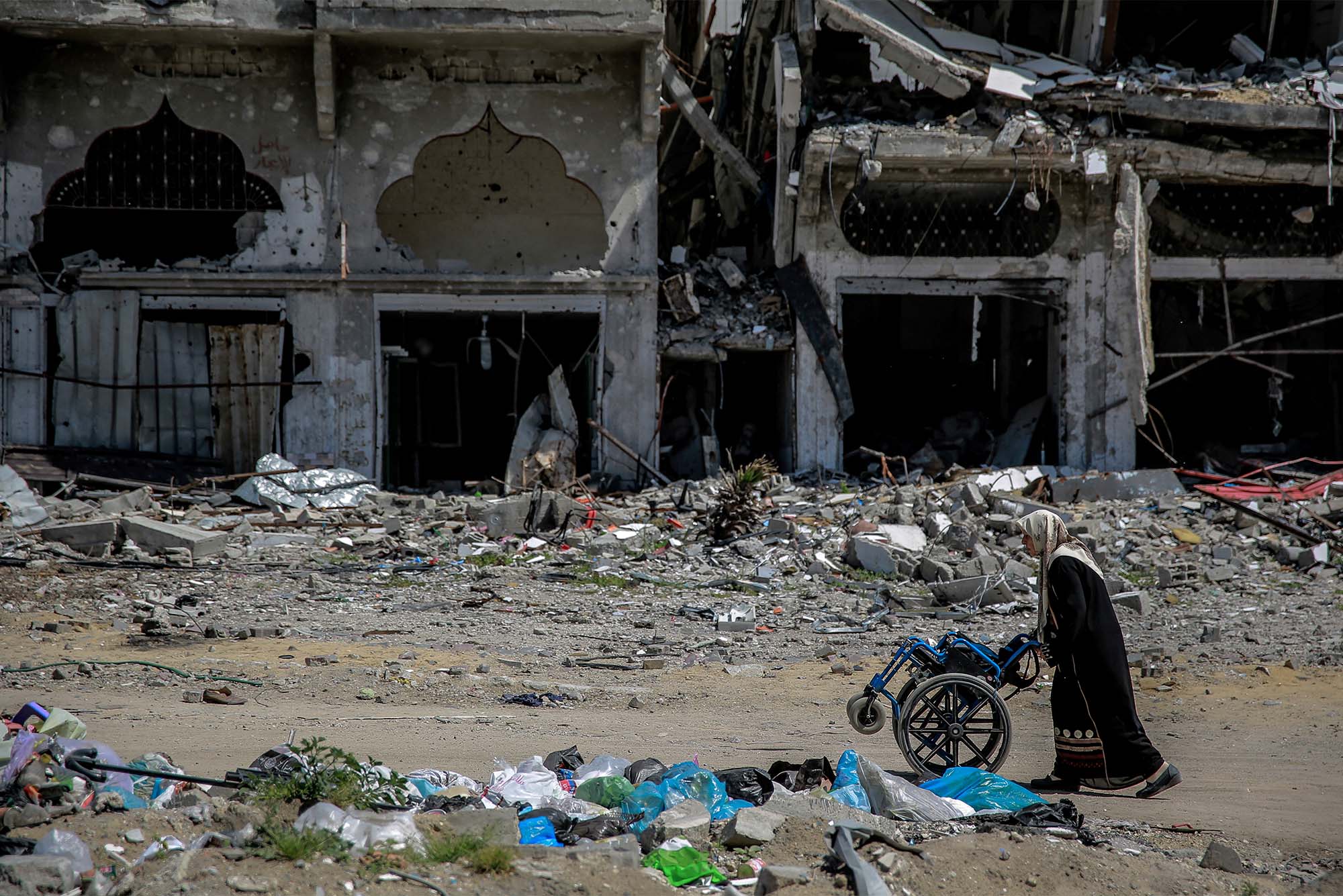Does the United States Have the Clout to Alter Netanyahu’s Course in Gaza?
BU’s Mark Storella examines the complex diplomacy underway, and how the US might have success influencing Israel’s leader

A woman pushing a wheelchair next to destroyed buildings in the northern Gaza Strip on March 21, amid the ongoing violence between Israel and Hamas. Photo by AFP via Getty Images
Does the United States Have the Clout to Alter Netanyahu’s Course in Gaza?
BU’s Mark Storella examines the complex diplomacy underway, and how the US might have success influencing Israel’s leader
President Joe Biden grows increasingly critical of Israel’s impact on civilians in Gaza. Secretary of State Antony Blinken travels the region trying to broker a solution permitting increased humanitarian aid. Senator Chuck Schumer (D-N.Y.) calls for new elections in Israel. And on Monday the United States allowed an immediate-cease-fire resolution to pass in the United Nations Security Council, abstaining rather than exercising its veto, as in the past.
But Israeli Prime Minister Benjamin Netanyahu remains committed to his course. Do American leaders have the clout to make him change direction?

“Yes, they have clout, but less than people think, and certainly less directly than people think,” says Boston University’s Mark Storella, a Frederick S. Pardee School of Global Studies professor of the practice of diplomacy.
“Israel sees this conflict as existential, and they want to defeat Hamas. In truth, the United States also has an interest in Israel defeating Hamas, as does Egypt, Saudi Arabia, Jordan, and the Palestinian Authority,” Storella says. “But we want to use our influence to ensure that Israel does so in a way that protects humanitarian principles and creates the groundwork for a future more enduring peace. That’s our challenge.”
Storella, who is also director of Pardee’s African Studies Center, was a US Foreign Service officer for more than three decades and US ambassador to Zambia from 2010 to 2013. He had various diplomatic roles touching on humanitarian issues and Palestinian issues before joining BU, including serving as Deputy Assistant Secretary of State for Population, Refugees, and Migration.
We asked him about Biden and Netanyahu, and their complex diplomatic relationship, which also involves Hamas, the Palestinian Authority, Egypt, and other countries in the region, the threat from Iran, and domestic politics in the United States and Israel.
Q&A
With Mark Storella
BU Today: If the Biden administration is unwilling to threaten any cutoff of military aid to Israel, what else can they do to convince Netanyahu to change course?
Storella: In diplomacy, there are three main tolls: threats, bribes, and reason. Calls for the United States to cut our military assistance to Israel are really nonstarters. First, there is no political will in the United States to do so. Second, Israel is a military superpower that exports weapons. Threats to cut off military assistance probably are only going to harden Israel’s position and decrease our influence. In terms of incentives, there are things we can offer, in terms of future security guarantees and in terms of our diplomacy with countries like Saudi Arabia, which Israel would find very attractive. I’m sure that Secretary Blinken is engaged in all of that right now. He is currently on his seventh trip to the region since October 7. But the tool that people don’t pay enough attention to is reason: showing Israel that it’s in Israel’s interest to prosecute this war differently from the way they are. And there are lots of ways we can do that.
BU Today: It doesn’t seem that has worked so far.
Storella: I don’t think that’s correct. There’s strong reason to believe that the United States was able to restrain Israel in its immediate reaction [to the terrorist attacks of October 7]. Hard to believe, but this thing could have been even more ferocious than it has been. And the United States has been influencing Israel to achieve that short ceasefire, and through diplomacy focused on the release of hostages and possibly another ceasefire, or at least a pause in hostilities. I would say we’re also influencing Israel through our pressure for more humanitarian assistance, although, to my mind, nowhere near what’s needed.
It is terrible, and there’s no denying it. There are 30,000 dead Palestinians, of which, even by Israel’s estimates, 20,000 are civilians, not fighters. And infrastructure. What are you going to build on for a future peace? And you must look at this from two perspectives. First, physical infrastructure: people need to live in a survivable environment. But second, political and emotional infrastructure. Where will be the will amongst Palestinians to cooperate with Israelis in the future?
BU Today: How do domestic political concerns in Israel affect the discussion?
Storella: Normally, we would say that foreign countries should not interfere in the internal politics of other countries. The fact is that the United States and Israel are deeply intertwined politically. It’s almost impossible for us not to interfere in one another’s domestic politics. I think that Netanyahu has done so and in a fairly partisan way, for a long time.
It’s clear that Biden and others in Washington find Netanyahu not to be a very cooperative partner, and they’d like to see someone else. Many Israelis strongly oppose Netanyahu. And many blame him for this catastrophe, through his [indirect] support for Hamas, his undermining of the Palestinian Authority, and his unwillingness to create conditions that give hope for autonomy and rights for the Palestinian people in the future. If there were an election now, he would lose. But I’m not sure that Israelis who are so focused on this war are prepared to go to an election right now. With time, that might change.
I think that the area that people don’t pay enough attention to is reason, showing Israel that it’s in Israel’s interest to prosecute this war differently from the way that they are
BU Today: What about in Washington, with Biden facing reelection?
Biden always talks about checking his gut, and at a gut level, he wants to support Israel. Israelis are still grateful for the very strong support he showed from the beginning, entering a war zone to embrace Israel and its leaders when all this started. I think that’s quite sincere. But Biden has an election. And in some key states, Arab American voters could conceivably cost him, as we saw in the Michigan primary. But if he were seen to be undermining or pulling back from our support for Israel, I wonder what other votes he would lose. So Biden is on a knife’s edge either way in American domestic politics, and Netanyahu knows it.
BU Today: Whatever he does could have serious consequences.
Yeah, he can lose voters both ways. And he can do it simultaneously. Generally, in American politics, foreign policy doesn’t play that big a role. For most of the United States, this is a foreign policy issue. For many Arab Americans, it’s not just foreign policy. So they may be motivated to vote. We saw that in the Michigan primary. But no one is really going to cut support for Israel.
BU Today: So what can he do?
Reason is probably the most effective method to influence Israel right now. The United States has a very strong interest in trying to push the Israelis towards a much more muscular humanitarian response. I have no idea why Israel would not want to provide much more humanitarian support to the people of Gaza—they’re going to have to live with them eventually. And the United States is applying its own muscular humanitarianism with military air drops, using a military pier that’s being set up as a conduit for aid. These are ways of indirectly showing that Israel has an interest in a much more robust humanitarian response and much better treatment or protections for Gaza civilians. We are reasoning with them on muscular humanitarianism, through action.
BU Today: What is the role of Arab countries in the region, such as Egypt and Saudi Arabia?
Israel and Netanyahu have a huge problem of what to do on the day after. How does one govern Gaza? There’s no clear answer to that right now. And you can see that there is an effort to cast around for various partners in the Arab world that could help stabilize Gaza, both through assistance and possibly through some kind of administrative or even security presence in the area. That’s very high stakes for most of those countries. But I would bet that that is under negotiation right now. I hope everyone is aware that most countries in the region have a very strong interest in blunting Iran’s ambitions. And while Hamas is not entirely dependent on Iran, it’s part of Iran’s Axis of Resistance, which the moderate Sunni countries in the region don’t like. They have a very strong interest in defeating Hamas, in part because it contributes to blunting Iran’s ambitions.
BU Today: It’s a complex situation, and presumably there’s a lot going on that we don’t know about.
There is a three-dimensional diplomatic chess game going on right now, with many players. Look where not just the Secretary of State Antony Blinken is, but also where CIA director William Burns is traveling, and you will see that we are engaging many different players throughout the region to try to make diplomatic progress right now. One should beware of facile analysis of what is going on in American diplomacy.
Comments & Discussion
Boston University moderates comments to facilitate an informed, substantive, civil conversation. Abusive, profane, self-promotional, misleading, incoherent or off-topic comments will be rejected. Moderators are staffed during regular business hours (EST) and can only accept comments written in English. Statistics or facts must include a citation or a link to the citation.